As a father, I understand that when our children are injured, our parental instincts take hold and we spring into action. These injuries are even more devastating & infuriating if the injuries occur at a facility that’s supposed to be watching our children.
If daycare neglect occurs, we have the right to get angry and also to pursue legal recourse.
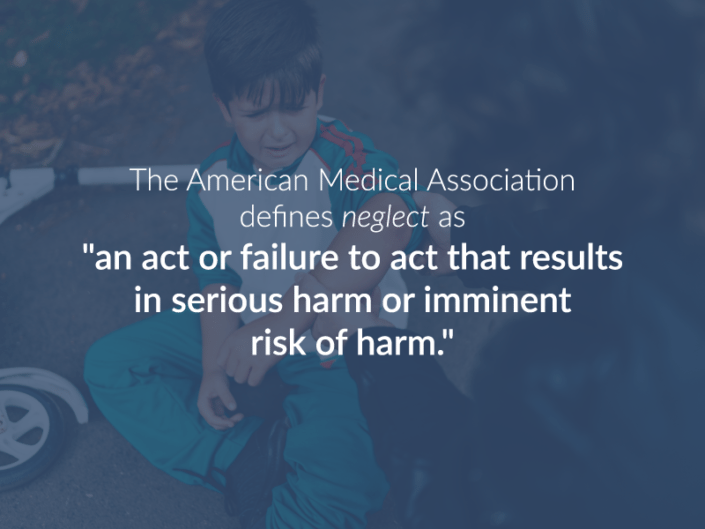
The American Medical Association defines neglect as “an act or failure to act that results in serious harm or imminent risk of harm.” Many types of injuries could fit under this definition, but one example would be an unsupervised child getting injured on the playground.
At the law office of J. Antonio Tramontana, we understand the sensitivity of these claims, and are dedicated to providing professional and discrete legal services to families in need. If necessary, we’ll help you contact the appropriate authorities, and provide legal recommendations if you decide to file a claim.
Criminal charges and civil cases are both options if a child gets hurt due to neglect. After the authorities have been notified, the government may decide to pursue criminal charges. Sometimes justice can be served by putting the neglectful operators behind bars; but, depending on the evidence, sometimes nothing can be done. And unfortunately, criminal charges will not compensate the child’s family for their pain and suffering.
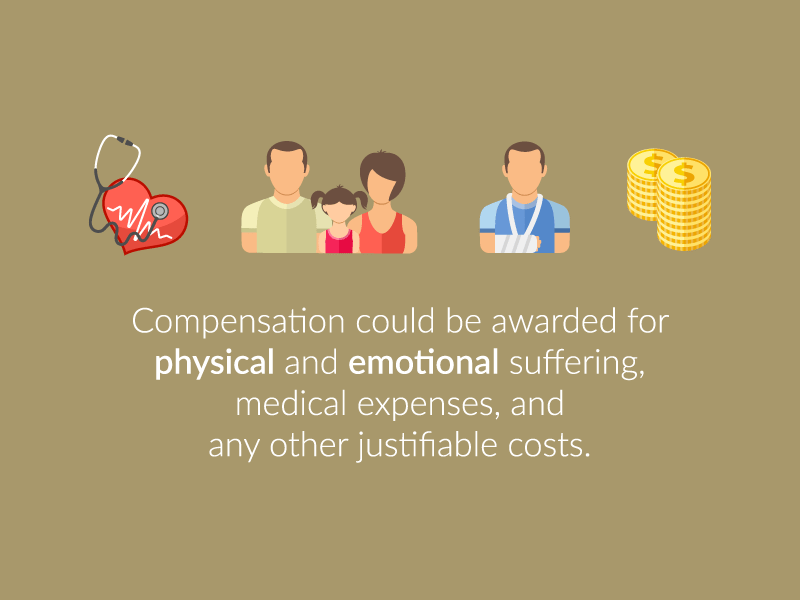
So regardless of the criminal case, children’s families may also pursue a civil case to hold the accused financially accountable as well. Compensation could be awarded for physical and emotional suffering, medical expenses, and any other justifiable costs.
Heed the warning signs and regularly inspect the condition of any facility or home providing care for your child. If your child was injured at a school or daycare, we want to hear your story, and we’re happy to answer any questions you may have. You can contact us at 318-340-1515 or TramontanaLaw.com
Ovarian cancer is rare, accounting for just 1.3% of new cancer cases in the U.S. However, Johnson & Johnson, a pharmaceutical company worth an estimated $70 billion, is paying millions of dollars in damages to plaintiffs across the country that allege the company’s talcum powder and bathing products caused their ovarian cancer.
In February 2016, a family from Alabama was awarded $72 million after successfully bringing their case against Johnson & Johnson to trial in St. Louis. A few months later, Johnson & Johnson lost another $55 million lawsuit to a South Dakota woman who blamed the company for her ovarian cancer.
A Louisiana woman recently came forward with similar claims. Shintelle Joseph says she’s been using the product for 10 years and was recently diagnosed with ovarian cancer.
According to The American Cancer Society, talc is listed as a risk factor, but not explicitly, or without reservation. There are many contradictory studies regarding the regular use of talc, the best of which doesn’t make any certain claim one way or the other, and therein, lies the problem.
The Louisiana Lawsuit Abuse Watch (LLAW), a nonprofit group based in Baton Rouge dedicated to stopping lawsuit abuse, believes there’s something else at work here. The organization is drawing awareness to the fact that without conclusive scientific evidence, Joseph’s case, along with similar ovarian cancer cases against Johnson & Johnson, may incite unsubstantiated fear and overburden our community’s legal resources.
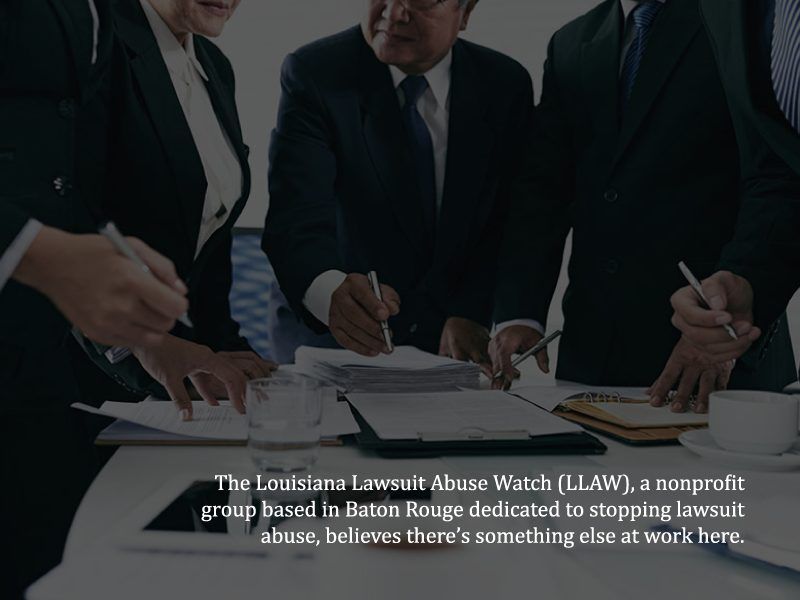
However, victims of unsafe consumer products, negligence, or defective drugs must have a voice and access to a defense if we are to hold corporations accountable for their actions. Louisiana has a questionable history of judicial access (see our story on Glenn Ford), so it’s important that we protect all of our citizens, especially the most vulnerable members of our society.
Louisiana needs skilled personal injury lawyers to help victims put their lives back together after an accident or injury, but we should approach these opportunities without the use of controversial tactics.
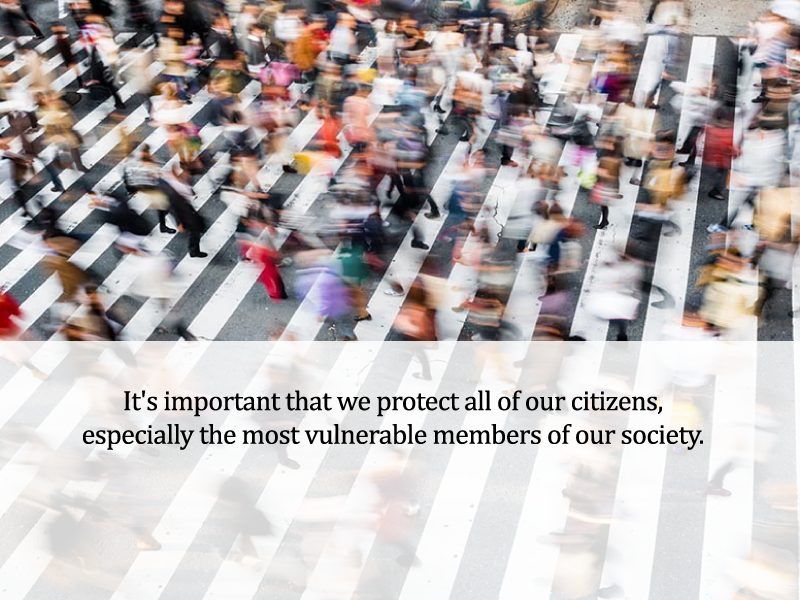
Aside from congesting the Louisiana court system, dubious personal injury claims have an impact on our state and economy. We need to help victims get back on their feet but without stagnating growth and development. In addition, dubious cases are vulnerable to being overturned by appellate courts.
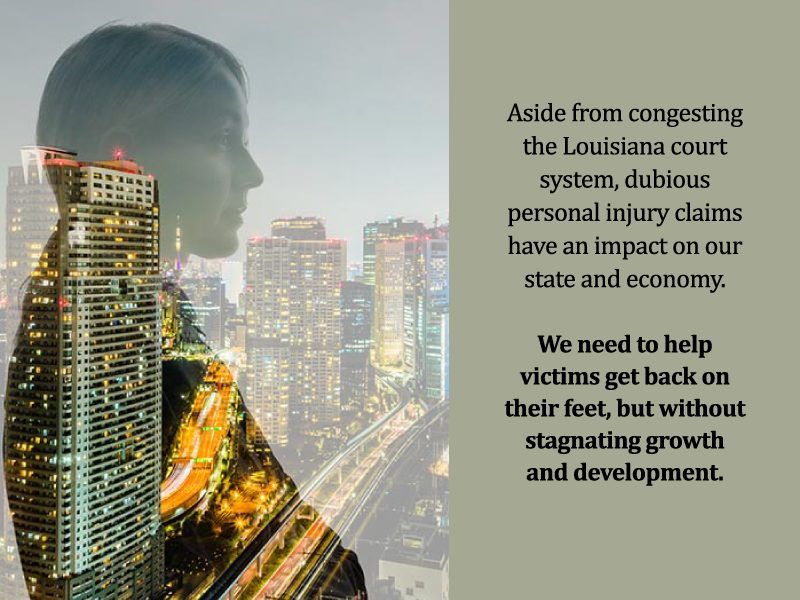
Here at the Monroe Law Office of J. Antonio Tramontana, Attorney at Law, we’re dedicated to our client’s interests as well as maintaining an equitable judicial system in the state of Louisiana. We specialize in a range of Louisiana personal injury claims including medical malpractice and auto accidents. If you have questions, we at the Monroe Law Office of J. Antonio Tramontana, Attorney at Law, want to hear from you.
For a free case review, please fill out the form to the right, or call me directly at (888) 982-1290.
In February of 2017, Jamie Lynn Spears’ 8-year-old daughter was in a traumatic ATV accident on her family’s Kentwood, Louisiana property. The child, Maddie, suffered critical wounds when she swerved her off-road vehicle in order to avoid a drainage ditch, reported TMZ, citing the Sheriff’s Department of Tangipahoa Parish.
Louisiana’s state laws regarding ATVs currently do not put restrictions on riders’ ages and they do not mandate drivers’ training, although the state does recommend training. Had there been laws in place to help children stay safe on ATVs, the accident may have been prevented.
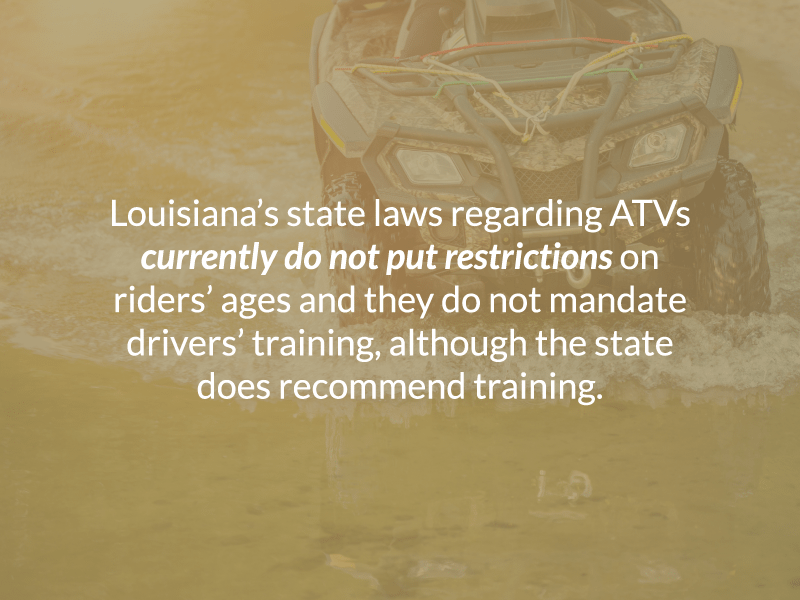
Maddie was said to have been submerged underwater for at least several minutes, while Spears’ and husband Jamie Watson tried to free her from the ATV. The young girl’s parents had made it to the scene of the accident within seconds after the crash; however, due to the vehicle’s netting, seatbelt, and weight, they were unable to bring her above water immediately, says TMZ.
When paramedics arrived several minutes later, they were able to free Maddie from the off-road vehicle and lift her out of the water. Nonetheless, the young girl was unconscious and had to be airlifted to a hospital in New Orleans that was about 80 miles from the property.
A source told Us Weekly that “Jamie’s got to be losing her mind” and that “Maddie grew up riding ATVs.” The source added, “Something must have gone way wrong.”
The accident occurred at roughly 3 p.m. local time on Sunday, February 6, 2017. TMZ first reported Maddie’s condition upon arrival at the hospital as “extremely serious.” According to the media outlet, by Monday afternoon, Maddie was reported as critical but stable.
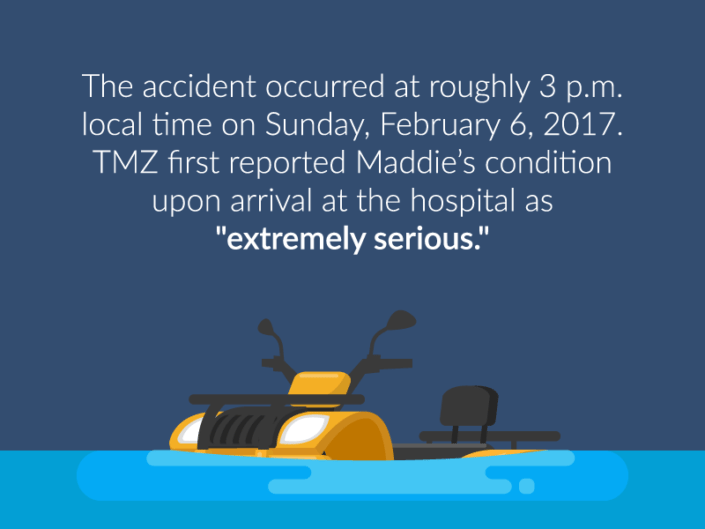
Because Louisiana does not currently have minimum age requirements for off-road vehicles, Maddie’s ATV accident begs the question: “Did something really go wrong or did a young person simply not know how to handle a potentially dangerous vehicle?” Following this celebrity family crash, I think it is a perfect time for residents of Louisiana to consider whether or not young riders should be of a minimum age, and what laws might help keep riders and their passengers stay safe.
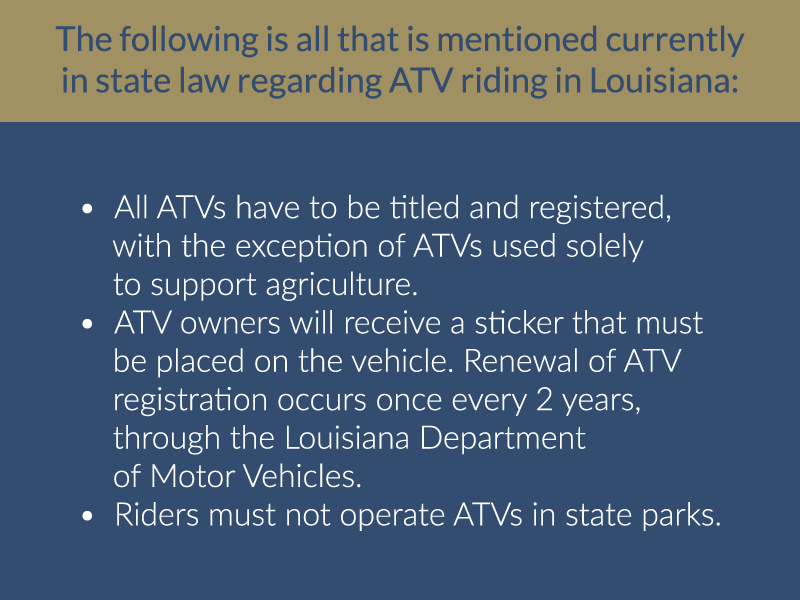
The following is all that is mentioned currently in state law regarding ATV riding in Louisiana:
Additionally, the Consumer Protection Safety Commission (CPSC) website states that there is no specific agency that regulates ATVs, offering only a suggestion to enroll in a safety-training course for ATV riding (which, as stated, is not mandatory).
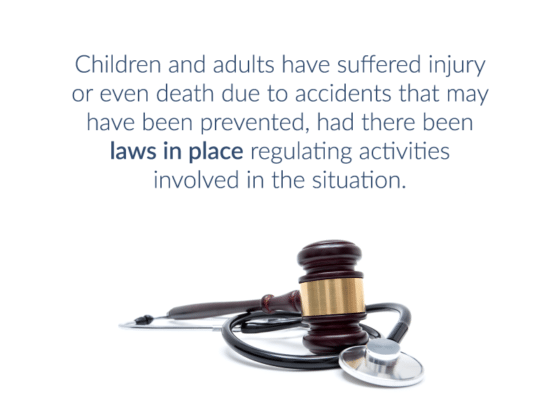
As a Personal Injury attorney, I have seen many scenarios like this and worse. Children and adults have suffered injury or even death due to accidents that may have been prevented, had there been laws in place regulating activities involved in the situation. I make it my business to help families deal with these kinds of tragedies, but despite my personal involvement, I wish these accidents would never happen.
If you have been involved in an accident in which you’ve suffered a personal injury in Louisiana, or if you’re wondering what remedies you and your family may be entitled to after an accident, please reach out. My law office, Tony Tramontana Attorney at Law, specializes in complex cases like those involving ATV accidents and other personal injury situations.
Please fill out the form on this page or call me at 318-340-1515 to receive a free consultation. I want to hear your story. I am here to help you get you the help and compensation you deserve.
According to the most recent census data and an economic news release by the Bureau of Labor and Statistics (BLS) of more than 4,600 occupational fatalities in 2014, Louisiana ranked 12th among all states, accounting for 120 fatalities caused by events or exposures pertaining to specific occupations.
Of the 120 fatalities recorded, transportation incidents, harm caused by other people or animals, and falls or slips were the most common causes for these fatalities; other causes include fires and explosions, exposure to harmful substances, and contact with objects and equipment.
Compared to other states, Louisiana ranks high for occupational fatalities, but moderate to low for non-fatal occupational injuries. According to the BLS, Louisiana has the 7th highest fatality rate among all states, with 6.3 fatalities per 100,000 full-time employees.
Louisiana is outranked by occupational fatality rates in Wyoming (13.1), North Dakota (9.8), Alaska (7.8), South Dakota (7.2), Mississippi (7.1), and New Mexico (6.7).
States with the highest nonfatal occupational injuries and illnesses rates, which are calculated per 100 full-time employees, include: Maine (5.3), Vermont (5.1), Washington (4.7), and Montana (4.6).
In the chart below, the state’s Nonfatal Occupational Injuries and Illnesses are calculated per 100 full-time employees, and Occupational Fatalities are calculated per 100,000 full-time employees.
(Note: Each state voluntarily elects to participate in the BLS Survey of Occupational Injuries and Illnesses (SOII) and the BLS Census of Fatal Occupational Injuries (CFOI). Some data was not available in states that chose not to participate in one or both surveys.)
All data from U.S. Bureau of Labor Statistics, Current Population Survey, Census of Fatal Occupational Injuries, 2016.
The type of work/industry a state’s population regularly engages influences occupational injury and fatality rates.
For example, Wyoming ranks 50th in the nation for population size but has the largest percentage of the workforce in mining and agriculture. The same is true of Alaska, where the population size is small compared to the percentage of workers in high-risk occupations, such as commercial fishing and logging.
The proportion of a workforce that is employed in these high-risk industries varies by state. This variation can help explain differences in fatal and non-fatal rates among states.
In Louisiana, workers in certain industries sustain nonfatal and fatal injuries at a much higher rate than the overall workforce; those industries include agriculture, forestry, fishing, and hunting.
Occupational injuries often result in lost wages, costly medical expenses, and emotional suffering. What’s worse, a wrongful death caused by negligence, poor working conditions, or unsafe equipment can destroy the lives of an entire family.
Whether it’s a broken bone, burn injury, neck or back injury, or catastrophic event, know that legal representation is available for you and your family.
Work-related injuries or fatalities can be devastating to a family. If you have any questions about an occupational injury or fatality, or if you suspect wrongful death caused by an employer’s negligence, we at the Monroe Law Office of J. Antonio Tramontana, Attorney at Law, want to hear from you.
For a free case review, please fill out the form to the right, or call me directly at (888) 982-1290.
Nursing home residents have the same rights and freedoms as anyone else. Yet, the institutional setting they live within combined with the disabilities that placed them in the institution can result in a loss of dignity and the absence of proper care. In 1987 Congress enacted the Nursing Home Reform Law which acts as the underlying policy nursing home rights.
Despite reform, nursing home abuse still occurs in Louisiana. In fact, 97.5% of Louisiana nursing homes were found to have health inspection deficiencies and 90% of nursing homes were insufficiently staffed. While nursing home abuse is no laughing matter, the 1996 golf comedy, Happy Gilmore, does lightheartedly touch on nursing home abuse. Today we're taking a look at the abuse that occurs in the movie and what Louisiana nursing home residents should know about their rights.
For those of you who haven't seen Happy Gilmore in some time or have never seen the movie, Happy starts playing golf to save his grandmother's home which is facing seizure from the IRS because of a large sum of unpaid back taxes. Grandma Gilmore is temporarily forced to move into a retirement home until Happy can come up with the $270,000 owed.
From the very minute Happy and his grandma drive up to the nursing home you can tell something is off, but as the movie progresses four instances of nursing home abuse actually occur. The abuse is perpetrated by a sadistic orderly, Hal who's played by Ben Stiller. The first instance of abuse occurs in Grandma Gilmore's first interaction with Hal.
Shortly after Grandma Gilmore gets settled into her new room Hal enters the room to inform Happy that it is now resident nap time. Once Happy leaves Grandma Gilmore requests a glass of warm milk before bed to which Hal replies, "You can trouble me for a warm glass of shut the hell up! Now you will go to sleep or I will put you to sleep."
In reality nursing home residents have the right to decide when they wake up and go to bed and Hal's nursing home would be in the wrong for enforcing a nap time. Residents, not nursing home staff, get to determine their hours of sleep. The abuse continues as the movie progresses and things only get worse.
This should be glaringly obvious, but it's illegal for nursing homes to use residents as slave labor. In another nursing home scene Hal uses his residents to make quilts during arts and crafts time which he then sells for a profit. When one of the residents refuses, Hal sends her off to maintain the lawn.
Assuming Hal wasn't even using his residence for labor, he'd still be committing abuse just for making them do something they don't want to do. Residents have the right to choose activities and determine how they spend their time. A nursing home cannot unwillingly force a resident into any activity.
Happy visits the nursing home on several occasions to check in on his grandma. In many of these occasions Hal is hovering over the two to make sure that Grandma Gilmore doesn't say anything unfavorable about the nursing home.
Again, Hal has infringed upon nursing home resident rights. Residents have a right to privacy when family and friends visit. Nursing homes should have areas for residents to receive private visitors where no one can intrude. Additionally, these rights to privacy extend to all aspects of care including communication with others via telephone and email.
Finally, nursing homes cannot make life threats. Moreover, no one can make life threats. Threats to take a life are illegal and can be a felony. In one particular scene when Happy visits, Hal appears in the distance using his hand to represent a gun, implying that he would kill Grandma Gilmore if she said anything about Hal's abuse.
Nursing homes can't make threats. In fact, residents should be free from reprisal in exercising any of their rights such as the freedom of speech. Residents have the right to be assertive and identify problems within the nursing home. Similarly, nursing homes have the duty to assist residents in both raising and responding to concerns.
When you suffer a personal injury in Louisiana, the clock starts to tick immediately, counting down the time you have to file a lawsuit that would allow you to seek reparations for any damages, expenses, or loss of income suffered as a result.
Time limits for civil lawsuits are called the Louisiana Statutes of Limitations and they determine how long you have to file a civil lawsuit. Time limits vary depending on the type of injury or legal claim, and they vary from state to state, so it’s important to be informed about your state’s limits and processes for filing a legal claim.
State legislators determine the time limits for various civil claims and crimes. These limits are representative of the public interest and function to serve both the public’s safety and individuals facing charges within the state’s criminal justice system.
Statutes of limitations function to ensure convictions are timely, and that those convictions only occur when the evidence does not depreciate over time.
A statute of limitation requires a criminal to remain in the same state where the crime was committed, and that he or she remain publicly visible, or gainfully employed, so law enforcement has the ability to pursue a public investigation.
Most time limitations on civil statutes in the state of Louisiana can be found in Louisiana’s Civil Code.
Not every legal claim has the same time limit, and there are several kinds of claims that cover a wide range of civil offenses, including assault and battery, fraud, medical malpractice, product liability, personal injury (like car accidents), and wrongful death.
Please see the charts below for a full list of case descriptions and the time limits we observe in the state of Louisiana.
| Description | Time Limit | Statute |
| Contract (in writing) | 10 years | La. Civ. Code art. 3499 |
| Contract (oral) | 10 years | La. Civ. Code art. 3499 |
| False Imprisonment | 2 years | La. Civ. Code art. 3493.10 |
| Assault and Battery | 2 years | La. Civ. Code art. 3493.10 |
| Fraud | 1 year | La. Civ. Code art. 3492 |
| Legal Malpractice | 1 year | La. Civ. Code art. 3492 |
| Libel | 1 year | La. Civ. Code art. 3492 |
| Medical Malpractice | 1 year | La. Civ. Code art. 3492 |
| Personal Injury | 1 year | La. Civ. Code art. 3492 |
| Product Liability | 1 year | La. Civ. Code art. 3492 |
| Property Damage | 1 year | La. Civ. Code art. 3492 |
| Slander | 1 year | La. Civ. Code art. 3492 |
| Trespass | 1 year | La. Civ. Code art. 3492 |
| Wrongful Death | 1 year | La. Civ. Code art. 3492 |
Current and new residents of Louisiana should prepare themselves for the possibility of these civil crimes and familiarize themselves with the time limits, so they know what to do in the event that legal action is necessary.
If too much time passes after a crime occurs, the Louisiana Statutes of Limitations will prevent you from pursuing restitution for loss or damage.
For example, personal injury claims and wrongful deaths have a one-year time limit in the state of Louisiana. The date the accident or crime actually happened is the date that begins this one-year period. Once the time limitations have expired, you are no longer able to file a lawsuit, nor can the offender be prosecuted for the crime.
In personal injury cases, the statute of limitations is only applied to the lawsuit and will not directly impact an insurance claim.
Coinciding with the statutes of limitations, states have comparative fault laws. Louisiana Civil Code 2323 states that Louisiana follows a comparative fault approach, meaning if the court decides that you contributed to your injury, your compensation will be reduced by the court-determined percentage of fault.
For example, if your damages amount to $100,000 and the court determined that you were 50 percent at fault, your total compensation would equal $50,000.
The Code also states that if a person suffers an injury, death, or loss due to another person's negligence, the comparative fault law does not apply.
It’s important that you act quickly with any civil claims you wish to file in the state of Louisiana. Your inability to file in a timely manner ultimately hurts you and your family if you’re seeking restitution for loss or damages.
If you reside in northeastern Louisiana and have questions about statutes of limitations, or a personal injury claim, we at the Monroe Law Office of J. Antonio Tramontana, Attorney at Law, want to hear from you. For a free case review, please fill out the form to the left, or call me directly at 318-340-1515.
In the State of Louisiana, drivers are required by law to report accidents that either result in injuries or in damages of over $100. Damages- whether physical or property- can be deceptively expensive, so we suggest reporting all accidents.
When you play it safe and legal and call police to file a report after a Louisiana car accident, you protect your rights as well. If the other party later tries to claim that you caused the accident, that police report will be a lifesaver for your case. What makes the police report so important? Information and official documentation – read on to find out why they matter.
While remaining within the legal guidelines is a must, there are also some clear benefits to filing a police report after an accident; the report filed now may be needed by your lawyer later.
The police report will include hard facts about the accident and provides much-needed information for your legal team. If you have been injured, these details will be needed to support you case in court and ensure that you receive all of the compensation you are entitled to. If you have been accused of contributing to the accident, then these details can help clear your name and ensure that the accusations do not impact your insurance or case settlement.
The report will cover the names of the people involved, describe any overt or obvious injuries or damages, properly identify the vehicles, drivers and witnesses; and since it is written by an objective third party, be accepted as an accurate account of what happened.
A police report also serves as official documentation of the accident and can be used by the court, your lawyer and the insurance company as evidence. Everything from the location of the vehicles to the weather outside will be documented in the report and serve as useful information for your attorney. Many personal injury cases are settled before the court is involved, so official documentation will help your attorney fight for you.
Three words: Call right away
While Louisiana does give you up to 24 hours to make the report, there is really no reason to wait. You should call the authorities in the city or town where the accident occurred or the state authorities if the accident was not within town limits. Calling the police at once allows them to see what happened immediately, not a day or two later or after the cars have been removed.
Call the police immediately after an accident, even if there do not seem to be injuries. This will protect your rights and make it easier for an attorney to help you out in the courtroom.
If you have been injured an accident, we can help. Contact us for a complimentary consultation about your case and to find out what compensation you might be entitled to. We are committed to protecting your rights and helping you fully recover from an accident and stand ready to help you however we can.
In an effort to combat distracted driving, New York is proposing legislation that will make it legal for law enforcement to use a "textalyzer" on the phones of drivers after an accident. The textalyzer, which allows police to determine if the driver was texting at the time of the accident, will make it much easier to identify when drivers have been operating their vehicles while distracted.
Nationally:
The numbers are clear – distracted driving, especially related to mobile device use, is a major issue on both a state and a national level. According to the the official government website on distracted driving – Distraction.gov – there were 3,129 deaths due to distracted driving crashes in 2014.
In Louisiana:
Louisiana Crash Data Reports, which gathers data on all crashes in the state of Louisiana, lists five fatalities and another 812 injuries due to cell phone use while driving in 2015.
The Distraction website lists a number of unsettling facts related to distracted driving, including the fact that a driver's eyes are off the road for a full five seconds while texting – enough time to drive the length of a football field blindfolded. It is no surprise then that so much can go wrong while texting behind the wheel. The driver is not aware of his or her surroundings while hurtling along in a dangerous vehicle traveling at potentially high speeds.
The texting-while-driving problem has a lot of parallels to the drunk driving epidemic, hence the name of the new device. Like the breathalyzer, the textalyzer can quickly determine if a driver was doing something that they shouldn't have. The risks of texting while driving are apparent now, as evidenced by the statistics and the many movements to discourage the dangerous practice. Drivers should be driving, not messing around on their phones – for both their own safety, and for the safety of everyone else on the road.
One of the main arguments for the adoption of the textalyzer by law enforcement is that it will give clear insight into whether or not the driver was using the device in the moments leading up to the accident. If law enforcement can identify the use of the device right before the accident, then prosecuting the offender for distracted driving becomes much easier. With successful prosecution and punishment, it will become clear to all drivers that distracted driving puts you at risk of getting in big trouble. Like with drunk driving, most people will prefer to control themselves rather than risk getting caught.
The fact that you can be obeying all the rules of the road, yet still get hurt due to another driver's negligence, is not OK. Yet every day, other drivers get behind the wheel and choose to endanger the lives of others. Fortunately, technological innovations like the textalyzer are making it possible to deter at least some of the bad behavior that puts innocent people at risk. It may take some time for all states to adopt the use of the textalyzer, but it is encouraging to know that solutions are being created to combat the rise in distracted driving due to mobile device use.
If you or someone you care about has been hurt in an accident caused by a distracted driver, it is important that you talk to an attorney about what happened. Our firm is here to answer your questions and help you determine if you have a case. Let us help you pursue those responsible for your injuries and make sure you get the compensation you deserve. Please contact us now to get started.
Open container laws prohibit the presence of any type of unsealed container that contains or contained an alcoholic beverage. They can include bottles, cans, and flasks as well as other types of containers inside vehicles, on the street, and on the sidewalk. Unsealed containers can be full, partially full, or even empty.
The U.S. federal government has provided states with a set of standards under the Transportation Equity Act for the 21st Century (TEA-21), which they are strongly advised to use when writing laws related to open containers. However, the right to create open container laws still falls on individual states. Currently, 43 of the 50 states have some form of open container laws in place. 40 comply with the federal standards, and Arkansas, Connecticut, Delaware, Mississippi, Missouri, Virginia, and West Virginia do not have any open container laws in place.
In Louisiana, the open container law as defined by LA Rev Stat § 32:300 prohibits the driver of a vehicle and the passengers from having an open container of an alcoholic beverage while operating the vehicle on a public highway or right of way. It is also illegal for the passenger to consume an alcoholic beverage while in the car and it is being operated.
There are exemptions to this law:
It should also be noted that a municipal ordinance in New Orleans allows the consumption and possession of alcoholic beverages in open plastic containers in certain districts such as the French Quarter.
An area of confusion regarding open container laws in Louisiana revolve around the many drive-through daiquiri shops in the state. A daiquiri in a cup in a vehicle is indeed legal in Louisiana when it is sealed. The term "sealed" is defined in this way:
When in doubt, the best course of action is, don’t do it. If you have an alcoholic beverage and you aren’t certain if it meets the criteria under the law the best thing you can do is put it away. Lock it in your trunk or glove box. Don’t take the chance of getting arrested, or worse, in a car accident; it isn’t worth it. Even if you haven't sipped an ounce of alcohol, you can still get a DUI, and that's certainly something you don't want on your record.
If you are facing a charge related to the Louisiana open container law, you need an attorney who will stand by you, who knows the law and will help you navigate the legal system. If you need legal representation for an open container case, schedule a free consultation to find out how we can help you.